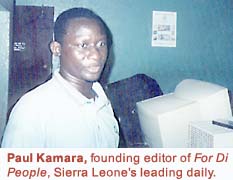Attacks on the Press 2002: Sierra Leone
With sierra Leoneans struggling to safeguard a fragile peace after 10 years of civil war, the Independent Media Commission (IMC) moved to fulfill its mandate. The IMC, which the government established in 2001 and is staffed by mostly government appointees and a few media personalities, grants publication and broadcast licenses, monitors government-media relations, enforces a…
Prominent Sierra Leonean journalist released
New York, March 11, 2003—Prominent Sierra Leonean journalist Paul Kamara, founding editor of the popular For Di People newspaper, was freed today after spending four months in prison on criminal libel charges. Kamara was released from Freetown’s Pa Demba Road Prison at around 10 a.m., according to sources there. Journalists, family members, and well-wishers greeted…

Prominent editor jailed and paper banned
New York, November 13, 2002-Paul Kamara, the founding editor of one of Sierra Leone’s leading newspaper, For Di People, was sentenced yesterday to six months in prison for defaming a local judge, said sources in the capital, Freetown. Kamara was taken to Freetown’s Pa Demba Road Prison on November 12 after the High Court convicted…
Attacks on the Press 2001: Africa Analysis
Silence reigned supreme in Eritrea, where the entire independent press was under a government ban and 11 journalists languished in jail at year’s end. Clamorous, deadly power struggles raged in Zimbabwe over land and access to information, and in Burundi over ethnicity and control of state resources. South Africa, Senegal, and Benin remained relatively liberal…
Attacks on the Press 2001: Sierra Leone
For the first time since 1996, no journalist was killed in Sierra Leone last year, a welcome development in a country that had earned the dubious distinction of being the most dangerous country in Africa for journalists. However, journalists were threatened by former rebels and government officials alike. In September, seven members of the independent…
Seven journalists threatened with assassination
New York, September 25—The Committee to Protect Journalists (CPJ) is gravely concerned for the safety of seven Sierra Leonean journalists, all longtime critics of the government who received identical anonymous death threats during the last week. CPJ obtained a copy of one letter, postmarked September 14 and signed by an otherwise unidentified “Danger Squad.” Titled,…
Attacks on the Press 2000: Introduction
By Ann CooperIN THE COMMUNITY OF JOURNALISTS WHO HAVE CHRONICLED the past decade’s worst wars, the news last May was devastating. Two of the world’s most dedicated war correspondents, Kurt Schork of Reuters and Miguel Gil Moreno de Mora of The Associated Press, were killed in a rebel ambush in Sierra Leone, a country where…
Attacks on the Press 2000: Africa Analysis
PRESS COVERAGE OF ARMED CONFLICTS CONTINUED TO STIR THE HOSTILITY of governments and rebel factions alike and claim reporters’ lives, but the prominent role of the press in the often-volatile process of democratization also brought unprecedented challenges to journalists working in Africa. CPJ confirmed that in 2000, five journalists were killed specifically because of their…